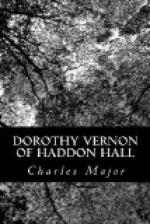“It do be right that some one should tell the King of the Peak as how his daughter is carrying on with a young man who does come here every day or two to meet her, and I do intend to tell Sir George if she put not a stop to it,” said Fletcher to some of his gossips in Yulegrave churchyard one Sunday afternoon.
Dorothy notified John, Jennie being the messenger, of Will’s observations, visual and verbal, and designated another place for meeting,—the gate east of Bowling Green Hill. This gate was part of a wall on the east side of the Haddon estates adjoining the lands of the house of Devonshire which lay to the eastward. It was a secluded spot in the heart of the forest half a mile distant from Haddon Hall.
Sir George, for a fortnight or more after my disappearance, enforced his decree of imprisonment against Dorothy, and she, being unable to leave the Hall, could not go to Bowling Green Gate to meet Sir John. Before I had learned of the new trysting-place John had ridden thither several evenings to meet Dorothy, but had found only Jennie bearing her mistress’s excuses. I supposed his journeyings had been to Overhaddon; but I did not press his confidence, nor did he give it.
Sir George’s treatment of Dorothy had taught her that the citadel of her father’s wrath could be stormed only by gentleness, and an opportunity was soon presented in which she used that effective engine of feminine warfare to her great advantage.
As I have told you, Sir George was very rich. No man, either noble or gentle, in Derbyshire or in any of the adjoining counties, possessed so great an estate or so beautiful a hall as did he. In France we would have called Haddon Hall a grand chateau.
Sir George’s deceased wife had been a sister to the Earl of Derby, who lived at the time of which I am now writing. The earl had a son, James, who was heir to the title and to the estates of his father. The son was a dissipated, rustic clown—almost a simpleton. He had the vulgarity of a stable boy and the vices of a courtier. His associates were chosen from the ranks of gamesters, ruffians, and tavern maids. Still, he was a scion of one of the greatest families of England’s nobility.
After Sir George’s trouble with Dorothy, growing out of his desire that I should wed her, the King of the Peak had begun to feel that in his beautiful daughter he had upon his hands a commodity that might at any time cause him trouble. He therefore determined to marry her to some eligible gentleman as quickly as possible, and to place the heavy responsibility of managing her in the hands of a husband. The stubborn violence of Sir George’s nature, the rough side of which had never before been shown to Dorothy, in her became adroit wilfulness of a quality that no masculine mind may compass. But her life had been so entirely undisturbed by opposing influences that her father, firm in the belief that no one in his household would dare to thwart his will, had remained in dangerous ignorance of the latent trouble which pervaded his daughter from the soles of her shapely feet to the top of her glory-crowned head.




